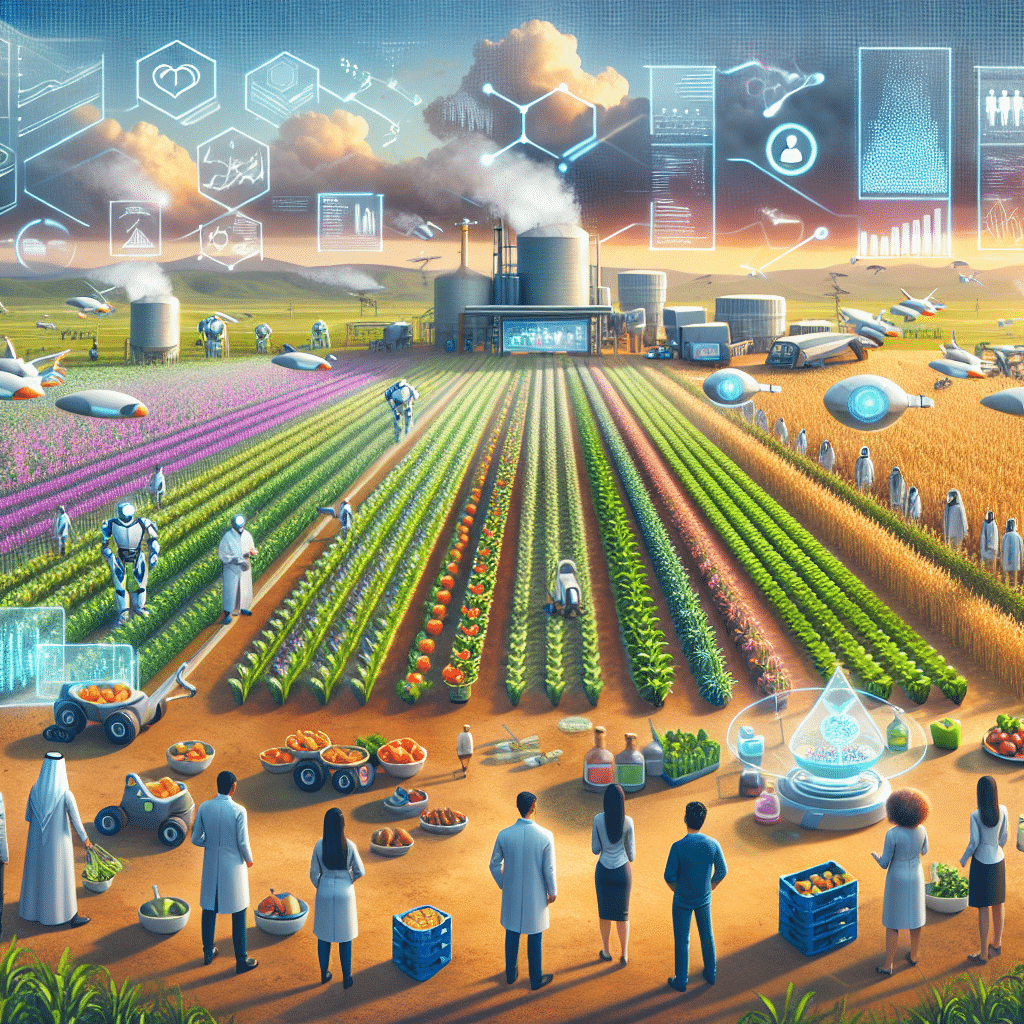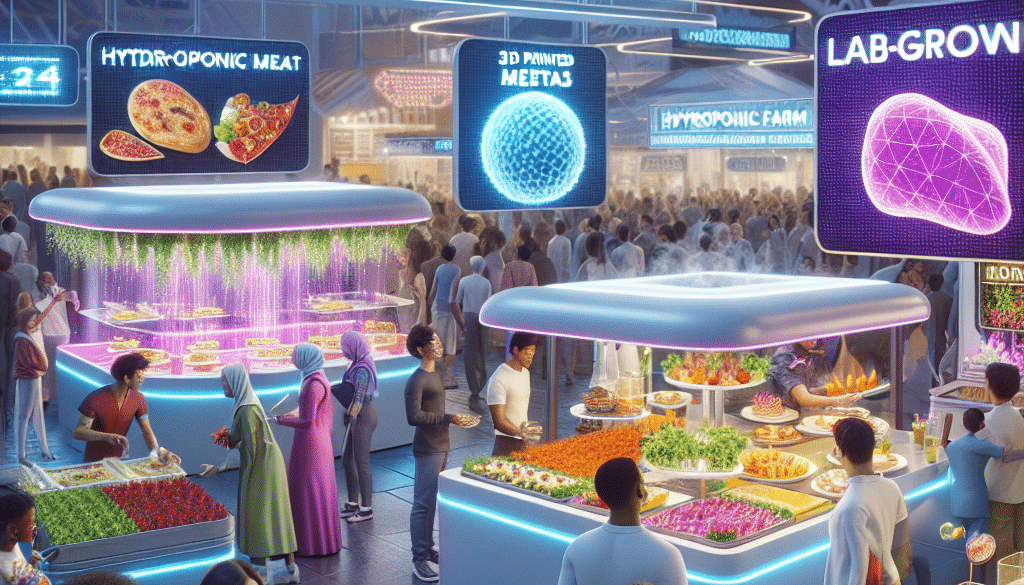The Future of Food: Top Trends in 2024
Table of Contents
- Future of Food: Top Trends Shaping 2024
- 1. Plant-Based Revolution Continues
- 2. Technological Advancements in Agriculture
- 3. Personalized Nutrition
- 4. Sustainability at the Forefront
- 5. The Rise of Functional Foods
- 6. The Emergence of Food as Medicine
- 7. Transparency and Traceability
- Conclusion
- Discover ETprotein’s Innovative Protein Products
Future of Food: Top Trends Shaping 2024

The food industry is a dynamic and ever-evolving landscape, with innovation at its core. As we look towards 2024, several key trends are poised to redefine what we eat, how we eat, and the impact our consumption has on the planet. In this article, we will explore the top trends that are shaping the future of food, offering insights into the next wave of culinary evolution.
1. Plant-Based Revolution Continues
The plant-based movement is not just a trend; it’s a revolution that’s here to stay. With growing concerns over health, environmental sustainability, and animal welfare, more consumers are turning to plant-based alternatives. By 2024, we can expect to see even more innovative plant-based proteins, dairy alternatives, and lab-grown meats that closely mimic the taste and texture of their animal-based counterparts.
- Expansion of plant-based seafood and poultry options.
- Increased availability of lab-grown or cultured meats.
- Enhanced nutritional profiles for plant-based products to match or exceed that of traditional meats.
2. Technological Advancements in Agriculture
Technology is revolutionizing agriculture, making it more efficient and sustainable. Precision farming, powered by AI and big data, allows for more accurate predictions and decisions regarding crop management. Vertical farming and hydroponics are also gaining traction, reducing water usage and allowing for local production in urban areas.
- Widespread adoption of IoT devices for real-time monitoring of crop conditions.
- Advancements in gene editing, such as CRISPR, to enhance crop resilience and nutritional value.
- Growth of urban farming initiatives to reduce food miles and carbon footprint.
3. Personalized Nutrition
As we become more aware of the unique nutritional needs of individuals, personalized nutrition will become more prevalent. By 2024, expect to see an increase in services and products that tailor dietary recommendations and food products based on genetic makeup, microbiome composition, and lifestyle factors.
- Integration of wearable technology to track dietary intake and health markers.
- Expansion of at-home testing kits for personalized diet plans.
- Customizable meal delivery services catering to specific health goals and dietary restrictions.
4. Sustainability at the Forefront
Sustainability will continue to be a driving force in the food industry. Consumers are increasingly making choices based on the environmental impact of their food. This will lead to more sustainable packaging, reduced food waste, and a focus on regenerative agriculture practices.
- Adoption of biodegradable and compostable packaging materials.
- Innovations in food preservation to extend shelf life and reduce waste.
- Support for local and seasonal produce to minimize transportation emissions.
5. The Rise of Functional Foods
Functional foods, which offer health benefits beyond basic nutrition, will see a surge in popularity. These foods are fortified with vitamins, minerals, probiotics, and other health-promoting substances to support overall well-being.
- Increased use of adaptogens and nootropics in everyday food products.
- Growth in the market for foods with immune-boosting properties.
- More options for foods that promote gut health, such as those containing prebiotics and probiotics.
6. The Emergence of Food as Medicine
The concept of food as medicine will gain more traction, with a focus on preventing and managing health conditions through diet. This trend will lead to collaborations between healthcare providers and food industry professionals to develop food-based solutions for health issues.
- Development of medically tailored meals for chronic disease management.
- Research into the role of diet in mental health and cognitive function.
- Partnerships between hospitals and local food producers to improve patient nutrition.
7. Transparency and Traceability
Consumers are demanding more transparency in the food supply chain. By 2024, expect to see advancements in traceability technology, such as blockchain, to provide consumers with detailed information about the origin, processing, and journey of their food.
- Implementation of blockchain for real-time tracking of food products.
- Greater emphasis on clear labeling regarding ingredients, sourcing, and ethical practices.
- Consumer apps that provide detailed product information with a simple scan.
Conclusion
The future of food in 2024 is shaping up to be an exciting intersection of technology, sustainability, and health. From the continued rise of plant-based alternatives to the integration of AI in agriculture, these trends are set to create a more efficient, ethical, and nutritious food system. Personalized nutrition and functional foods will cater to individual health needs, while transparency and traceability will build trust between consumers and producers. As we embrace these trends, we can look forward to a food industry that not only feeds but also nourishes and sustains both people and the planet.
Discover ETprotein’s Innovative Protein Products
In line with the future trends of food, ETprotein is at the forefront of providing high-quality, sustainable protein solutions. Their extensive range of organic bulk vegan proteins and L-(+)-Ergothioneine (EGT) products cater to the growing demand for plant-based nutrition and functional ingredients. Whether you’re a manufacturer, distributor, or consumer looking for allergen-free, non-GMO protein sources with exceptional purity, ETprotein’s offerings are worth exploring. Their commitment to quality and innovation makes them a valuable partner in the evolving landscape of the food industry.
About ETprotein:
ETprotein, a reputable protein and L-(+)-Ergothioneine (EGT) Chinese factory manufacturer and supplier, is renowned for producing, stocking, exporting, and delivering the highest quality organic bulk vegan proteins and L-(+)-Ergothioneine. They include Organic rice protein, clear rice protein, pea protein, clear pea protein, watermelon seed protein, pumpkin seed protein, sunflower seed protein, mung bean protein, peanut protein, and L-(+)-Ergothioneine EGT Pharmaceutical grade, L-(+)-Ergothioneine EGT food grade, L-(+)-Ergothioneine EGT cosmetic grade, L-(+)-Ergothioneine EGT reference grade and L-(+)-Ergothioneine EGT standard. Their offerings, characterized by a neutral taste, non-GMO, allergen-free attributes, with L-(+)-Ergothioneine purity over 98%, 99%, cater to a diverse range of industries. They serve nutraceutical, pharmaceutical, cosmeceutical, veterinary, as well as food and beverage finished product distributors, traders, and manufacturers across Europe, USA, Canada, Australia, Thailand, Japan, Korea, Brazil, and Chile, among others.
ETprotein specialization includes exporting and delivering tailor-made protein powder and finished nutritional supplements. Their extensive product range covers sectors like Food and Beverage, Sports Nutrition, Weight Management, Dietary Supplements, Health and Wellness Products, and Infant Formula, ensuring comprehensive solutions to meet all your protein needs.
As a trusted company by leading global food and beverage brands and Fortune 500 companies, ETprotein reinforces China’s reputation in the global arena. For more information or to sample their products, please contact them and email sales(at)ETprotein.com today.














